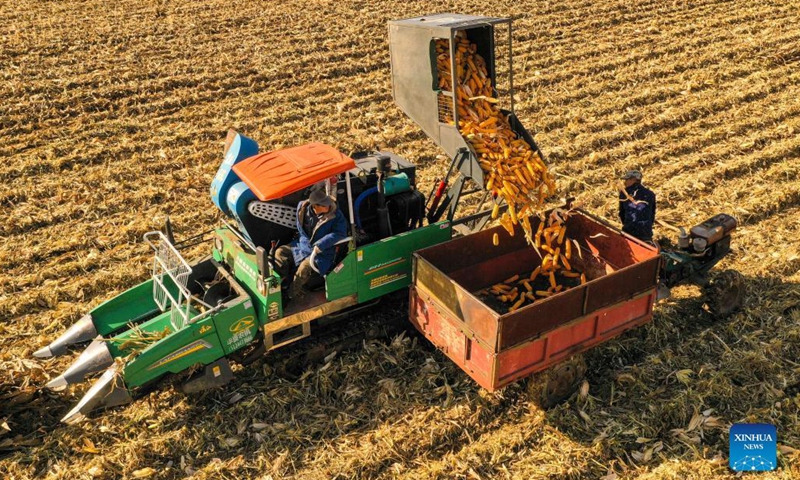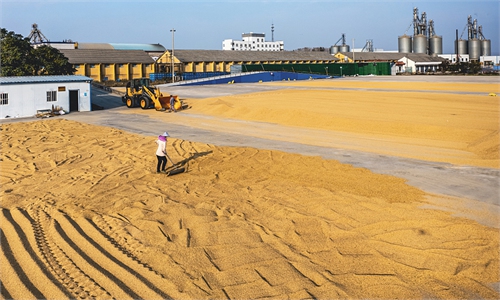Xi stresses food security at key central rural work conference
Nation to ensure grain harvest above 650b kg in 2022, increase soybean output

Aerial photo taken on Oct. 10, 2021 shows farmers harvesting corns in Huapichang Town of Jilin City, northeast China's Jilin Province. Jilin recorded a bumper grain harvest, with the total grain output reaching 40.39 million tonnes this year, up more than 2.36 million tonnes year on year, according to data released by the National Bureau of Statistics.(Photo: Xinhua)
President Xi Jinping renewed an emphasis on food security during a key rural work meeting over the weekend, stressing that the Chinese people's rice bowl must be firmly held in their hands at all times, while also calling for efforts to increase production of soybeans and oilseeds, for which China relies heavily on imports.
Xi presided over a meeting of the Standing Committee of the Political Bureau of the Communist Party of China Central Committee on issues related to agriculture, rural areas and farmers, and delivered an important speech, before the annual central rural work conference, according to the Xinhua News Agency.
Xi emphasized during the meeting that ensuring the supply of primary products is a major strategic issue, noting that the Chinese people's rice bowl must be firmly in their hands at all times, and rice contained in the bowl must be mainly China-grown.
Xi also called for efforts to adjust the land structure, expand the planting of soybeans and oilseeds, and achieve "measurable results."
The central rural work conference usually sets rural and agricultural policy priorities for the coming year. Work on agriculture and rural areas has been high on China's policy agenda for 18 consecutive years, and it is usually the first policy document released by China's central authorities each year.
This year's meeting vowed that the country will maintain a stable grain output exceeding 1.3 trillion jin (650 billion kilograms) in 2022 - a level China has maintained for six years.
The meeting also stressed efforts to consolidate the results of poverty alleviation, improve the lives of people who have been lifted out of poverty, ensure that there is no large-scale return to poverty, and effectively maintain and consolidate the great achievements of the country's fight against poverty.
Experts pointed out that the meeting, which centered on food security and self-reliance, reflects the current complicated situation both at home and abroad.
Food supply in China remains relatively stable and secure, as the country's high-level rice and wheat output can fully meet domestic demand, and the grain production can basically meet the nation's demand, while relying on an appropriate amount of imports, Li Guoxiang, a research fellow at the Chinese Academy of Social Sciences, told the Global Times on Sunday.
Li stressed that China retaining a high level of food security will also contribute positively to global food supplies, as the large population in China has a relatively high demand for food consumption. He added that stable domestic agricultural prices and abundant food supply will also establish a solid foundation to ensure the stability of the economy for 2022.
China's grain yield was equal to 1.339 trillion jin in 2020, 11.3 billion jin more than the previous year, a year-on-year increase of 0.9 percent, according to data from the National Bureau of Statistics.
Experts also pointed out that calls for expanding production of soybeans and oilseeds - for which China largely relies on imports from the US - are also a clear signal to step up self-reliance in response to shifting China-US relations.
Li said that with the country's continuous efforts to expand the production capacity of both crops by increasing planting areas and yields, China's reliance on imports will go down, while demand and supply for soybeans have both gradually stabilized.
Meanwhile, China has also been diversifying the import sources of soybeans in order to ensure a stable supply. For example, Li noted that China has been cooperating with countries like Russia to increase planting areas, aiming to secure more imports from diversified sources.

